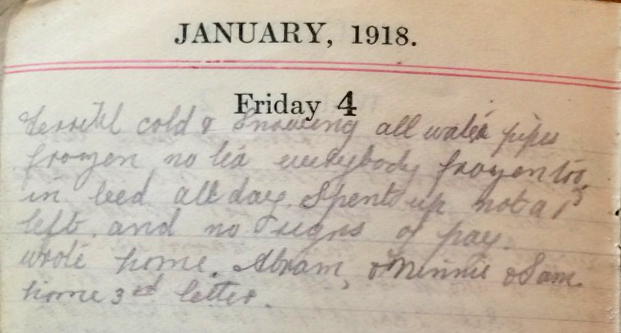Friday, Jan 4th, 1918
Terrible cold and snowing. All water pipes frozen. No tea. Everybody frozen too. In bed all day. Spent up, not a penny left and no signs of pay. Wrote home, Abram, Minnie and Sam. Home third letter.
Frank broke the monotony of having nothing to do, by writing letters. He wrote ‘home’ to his wife, Sarah Elizabeth, and his daughter, Olive. He also wrote to other members of his family: Abram Sutton, his brother-in-law, was serving with the 27th King’s Liverpool. At this time, he was with A Company at the Sidestand Camp near Cromer in Norfolk. Minnie Greenhalgh was Frank’s sister and the mother of Harold, who was also in Salonika. Sam was Frank’s oldest brother, too old for war, but with sons also fighting. Read more about the Postal Service in WWI.
Hugh MacDairmid and the weather of Salonika
Once again, the greatest test for Frank and his comrades is that posed by the cold weather. Camping under canvas in the winter must have been almost unbearable and impossible to keep warm – especially without tea!
Sergeant Christopher Murray Grieve, better known as Hugh MacDiarmid, the famous Scottish poet and writer, served in Salonika from August 1916 to May 1918. He wrote ‘A Salonikan Storm Song’ just after he arrived in the country, the opening verse of which Frank would have probably identified with:
Sing ho! for life in the tented field
On a night of wind and rain
When the sun-baked ground goes suddenly soft
And the guy ropes tug and strain
And the pegs come up
And the tents go down
Sing ho, for the winds that beat and blow
Sing hey, for the showers that drown!
Twenty months later MacDiarmid was invalided from Salonika with recurrent malaria. When fit to return to duty he rejoined the Royal Army Medical Corps, this time in France. In an amazing coincidence, after the Armistice, his and Frank’s experiences touched again. As his biographer noted, MacDiarmid moved from the RAMC to ‘the Indian Medical Service and was posted to the Sections Lahore Indian General Hospital stationed at the Chateau Mirabeau at Estaque near Marseilles’.¹ Could this be the very hospital to which Frank had alluded on December 8th, 1917, when he wrote of seeing sick and dying Indian soldiers?
References & further reading
¹ ‘MacDiarmid: Christopher Murray Grieve, a Critical Biography’ by Alan Norman Bold (University of Massachusetts Press) Chapter 4 ‘Thistleonica’


